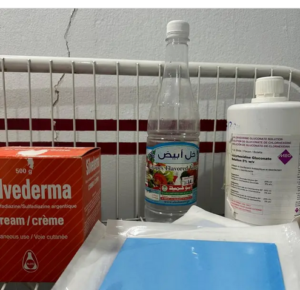Gaza bombardment worsens superbug outbreaks

Vinegar is being used to disinfect and treat wounds because other medicines are unavailable
Misbah Khan reports for the Bureau of Investigative Journalism on 19 November 2024:
Medical organisations, including MSF and Medical Aid Palestine, say that targeted bombings of hospitals and humanitarian aid blockades are restricting access to healthcare in Gaza, exacerbating infections that don’t respond to essential medicines.
In some cases, doctors have run tests to discover that infections can be fought with certain antibiotics – but have not been able to get their hands on the life-saving drugs.
‘I’ve never seen these types of cases before’
As explosions sound in the background, Dr Alaa Alshurafa tries to relay her day-to-day experience treating superbug infections in Gaza city. Over a WhatsApp call that keeps cutting out, she conveys the damage these drug-resistant infections are inflicting in the war zone.
Dr Alaa, 30, was forced to flee her home in northern Gaza with her family after the war began. Despite this, she is serving as a doctor at one of the medical points set up by The International Federation of Red Cross and Red Crescent Societies (IFRC) in Gaza city.
Every morning, before she leaves for work, she checks that no one on her route has reported a warning from the Israeli Defense Force of a potential airstrike. The clinic is a 15-minute walk from where she lives. She has to do the journey on foot, leaving her exposed to a potential attack by drone, air or sniper. Once she does arrive at the clinic, the medical point is flooded with more than a hundred patients a day.
When she spoke to TBIJ, she was facing an outbreak of impetigo, a highly contagious bacterial skin infection most common in children. It causes blisters and itchy sores and is usually treated with an antibiotic cream.
“I’ve never seen these types of cases before,” Dr Alaa said. “It’s a very severe form of impetigo, an extensive form which includes faces and the whole body. We don’t have sufficient antibiotics.”
What little medicine is available is extremely expensive and while it does work sometimes, it is not always effective. “I’ve seen many cases that come again and again because of failure of treatment,” she said. “The rate of reinfection [could be] because of overcrowding and maybe misuse of antibiotics or nonadherence to the antibiotic regime plays a role.”
The most common type of bacteria that leads to impetigo is Staphylococcus aureus. A drug-resistant variant of this bacteria is behind the MRSA superbug.
